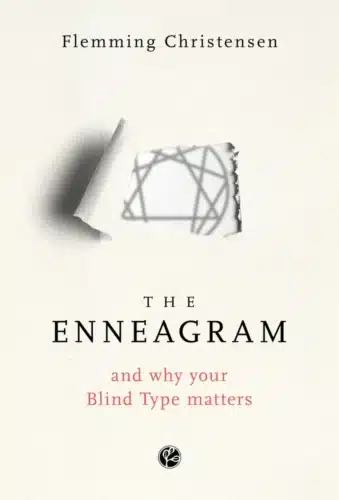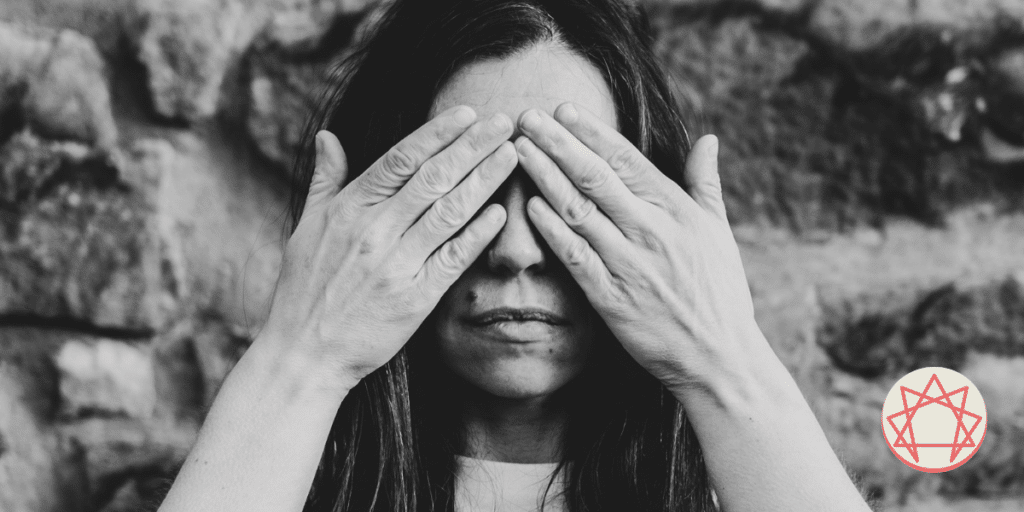The blindness neglects part of me, part of my type. So if I work on my blindness in my blind type, I will actually create openings in my primary type because my blind type has negative assumptions that are holding my primary type down or back. Your blind type would be qualities that you do not master.
Flemming Christensen on Enneagram Insights podcast
Flemming Christensen has written the book “The Enneagram and why your Blind Type matters”.
He has given a talk about the blind type and it is published as an episode in the “Enneagram Insights podcast – On Awareness, Presence and Relationships”.
This blogpost is a transcript of some of it.
Negative assumptions about your blind type
The blind type is some of the qualities within the Enneagram that you don’t really recognize.
The type that you have the least is your low score or your blind type.
So your blind type would be qualities that you do not master.
You might even think that when people are doing it they are ridiculous.
Because it is blind, it is shadow work.
Type five´s positive assumptions
You would have negative assumptions about your blind type.
You have positive assumptions about your primary type.
A positive assumption of type five:
“So if I investigate, go deep, explore, keep myself objectively. If I observe, if I kind of close down my emotions. If I can combine two fields of knowledge into a new one.
If I can find the truth, then everything is good. So I have positive assumptions about if I do that, things are good.
Type five blind on type three
But if I would relate to type five and are blind on type three then everything type three is doing would have negative assumptions connected to it.
So I might think that type three, they are too fast. They speak without knowing what they talk about.
They like to speak but talk empty. Nothing in them. And they would even stand up and teach about the Enneagram five minutes after they have downloaded a podcast about the types. Are they crazy?
What if they get a question about something that they cannot answer? They will look like idiots. I would never look like an idiot. I would be super prepared. And then they just go pragmatically to the solution and the end.
They they skip. They skip the real deal.”
So that would be five being blind on three.
Type five blind on type two
But I could also be five blind on two:
“All those relating to what happened this week and how you are, how your poodle is doing. You bought it kind of a new one last weekend.
Oh, let me tell you about my poodle.
So what about your travels and your parents? Did you like them when they came over? Connecting, connecting, connecting, chatting, engaging each other. Five blind on two. I would hate it. Normally I hate it.
Now I will double hate it. If I’m even blind social, I will triple hate it now being blind on two. So all those two Ness, they’re getting too close.
They’re kind of invading my private sphere. Get out of here.”
So a person who relates to type five would appear very differently in the world, being blind on three or blind on two or blind on one or whatever.
The blindness
The blindness neglects part of me, part of my type.
So if I could work on my blindness in my blind type, I would actually create openings in my primary type because my blind type has negative assumptions that are holding my primary type down or back.
Being blind to you cannot be blind to your primary type. That’s the definition.
It means that you just haven’t worked on your primary type yet.
But blind to one of the other eight means that something in one of the other eight is holding you back or calming you down or preventing you from a real breakthrough.
So it should be that you are seeing the types on the enneagram and that you see some assumptions.
The different types have that when I do that.
Negative assumptions – type three blind on type seven
I might have negative assumptions about other types.
That would be my blind type.
So if I was type three, blind on seven, I would think that they’re super childish, ridiculous and they waste their life.
They start everything up without completing it.
Thank you that I’m not like that. I complete stuff. I achieve stuff. I win. I’m the best. I’m not just kind of an initiator.
Type three blind on type eight
Or maybe if I was type three blind on type eight.
Maybe I see it like a child in an adult body. Just walking around like one big muscle with no brain, really, maybe an immature brain.
And it’s all about working hard and never working smart.
Why would I do that?
So your type will have negative assumptions about your blind type.
Highly personal
The way that I would look at type eight as a type three would be very different from another type three blind on eight.
And this is also highly personal.
So blindness holds you down.
It keeps you away from skills for one reason or another.
Blind on type eight
So if I was blind on type eight, it would be difficult for me to stand in my power.
To be with my autonomy.
It would be difficult to set healthy boundaries. I would not know how to do that. So if I was blind, if I was type three blind on eight and I started practicing standing in my power.
Feeling autonomy and setting healthy boundaries. I would probably not be so conflict avoidant as I would probably be not having mastered the skills of type eight.
Then the tendency of going towards nine and hoping that the conflict would solve themselves, that would probably be enforced.

Sense of purpose
When you discover your blindness in your blind type, you will sense a certain sense of meaning or sense of purpose.
Because you would actually move up in the levels of development by Don Riso and Russ Hudson.
You would have a new perspective on yourself, your relationships, your friends, your work, your own spirituality. So the breakthrough that you’re missing in your work with your primary type might be coming from blind type.
It could also be coming from the blind spot.
There’s a lot of released energy there, but it will give you more freedom. Freedom from your personality, freedom from attachment.
Working on your blind type will give you a deeper sense of meaning and purpose.
Accept and building skills
So that is finding the freedom of not being attached or identified with personality slash type slash ego is the blind type.
It’s all about the same process. Accepting, yeah, I’m blind.
And then building skills. But you have to build skills in a particular structure. So I have made what I call levels of competencies.
So per type, like it’s like in sports. If you want to play tennis and you have never played tennis before, maybe the teacher will give you a racket and a ball and a wall.
And then you will hit, I don’t know, gazillion tennis balls against a wall.
That’s kind of where you have to start somewhere.
And then when you know how to do that, then we can build on top of the competencies.
So there is a whole structure for how to build skills in the type that is blind to you.
Read more about blind spots and blind types
Blindness keep you safe
And we have to be careful.
Because the blind type is blind for a reason. Blindness is trying to keep you safe. So we should not just kind of move it all away and take the blindness away from you.
It can be unhealthy. It could be traumatic. So we have to work. Subconsciously, and we do that with our archetypes and narratives.
We cannot go directly in as we would do with the primary type. So the whole program that I have designed is about how do we actually talk to something that we cannot see?
How do we work with something that we don’t connect that much with?
Because it’s blind. You don’t see it.
So we have to work subconsciously so we can avoid all the mechanisms that would protect your blindness.
This was a Blogpost with a transcription from Flemming Christensen´s talk on the Blind type in Enneagram Insights Podcast.
Read more about “The Enneagram and why your blind type matters.”






